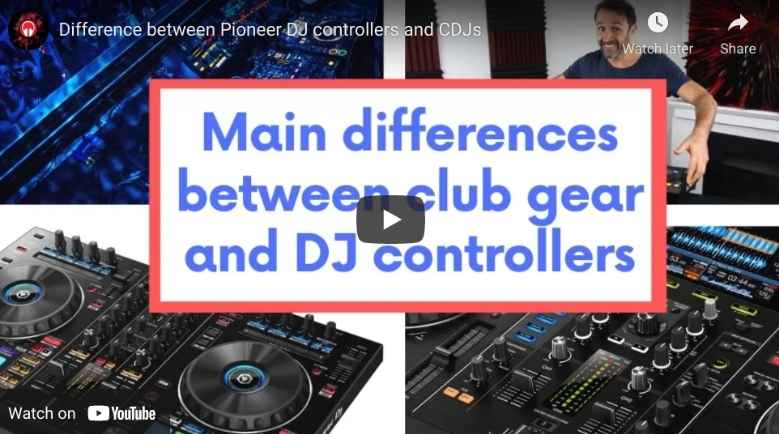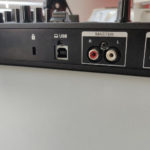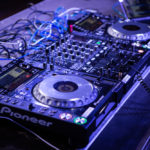Unless you plan on kickin’ it old-school with some dope analog turntables, your primary options for spinning some tracks and filling some dance floors are a DJ controller or CDJs.
As they share a few similarities, these two digital doorways into the DJ industry are often confused with one another. Still, there are some key differences that you should know about before you decide which is right for you.
You may not realize it just yet, but this choice is going to have a seismic effect on your budget, how you DJ, how quickly you can set up for a show, how you travel, and your accompanying gear. So, without further ado, let’s get this digital dogfight underway!
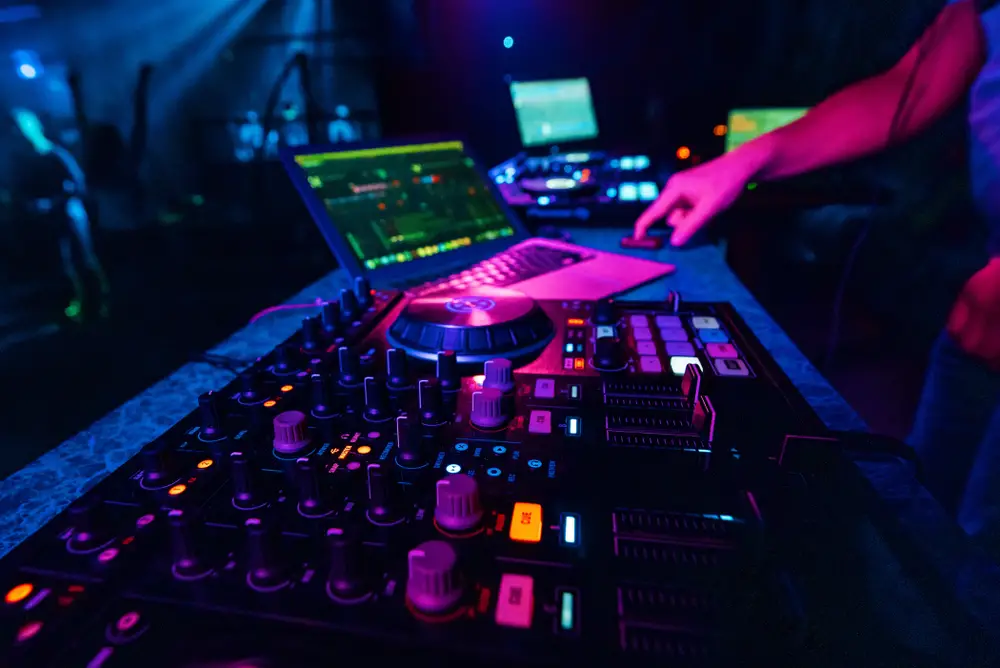
DJ Controllers Vs CDJs: What Do They Look Like?
Before we dive into some of the more technical comparisons, let’s just take a quick look at each device, if only so you have a clear picture of them in your head when I start waffling about them individually later on.
Allow me to introduce the first contender, the DJ controller…
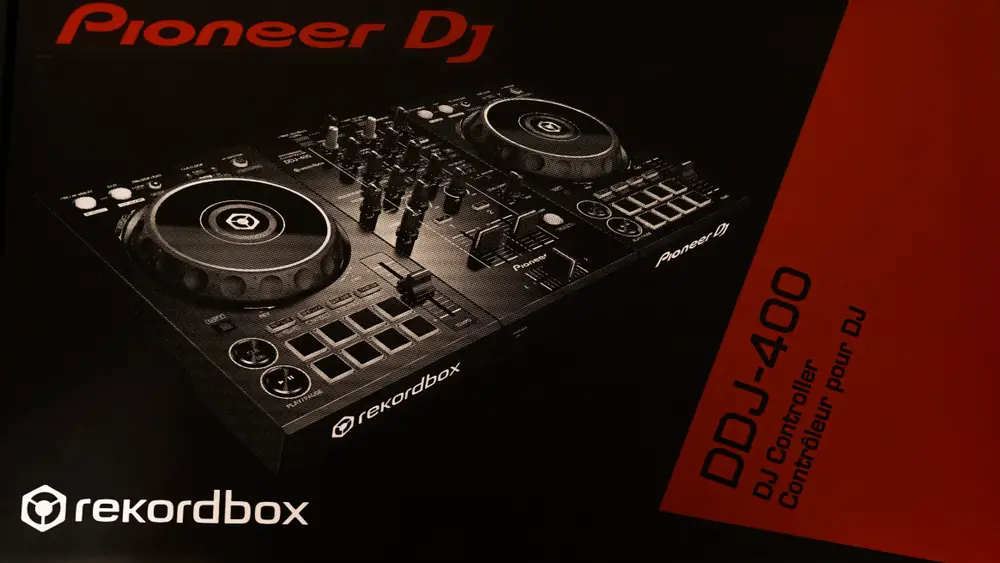
This is the Pioneer DJ DDJ-400 – 2-deck Digital DJ Controller — a pretty standard example of these devices.
Now, allow me to introduce the competitor, the CDJ…
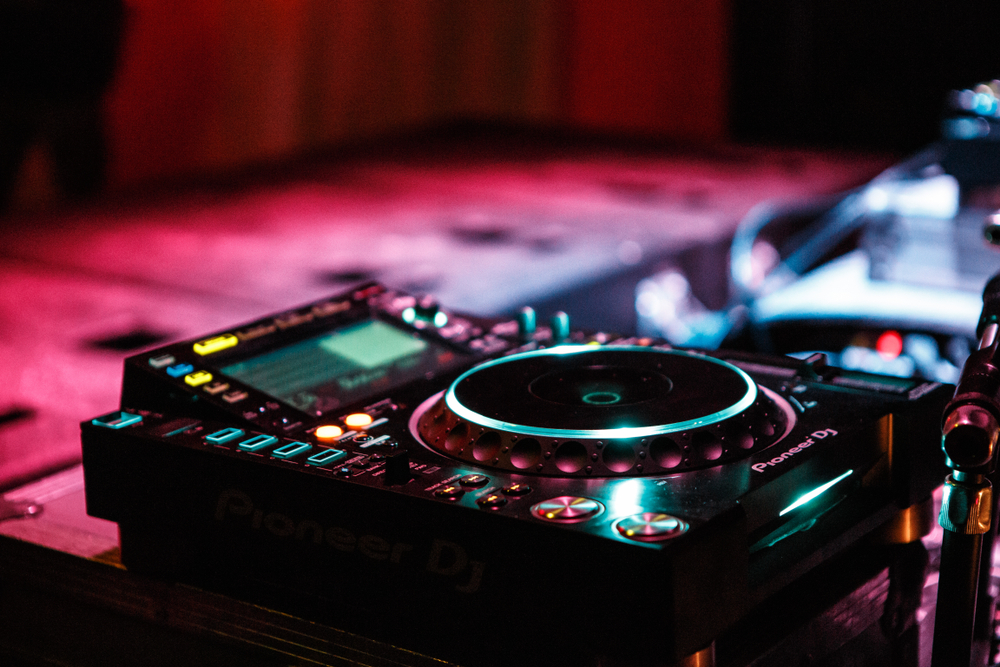
This is the Pioneer CDJ900NXS Nexus. So, straight off the bat, you can see that these are very different devices physically speaking, so why are they the cause of so much confusion? Well, it’s mostly because they share some features and do similar things.
Furthermore, as DJs typically use one or the other, people tend to think they’re completely interchangeable, but I’m about to tell you why that’s not the case.
DJ Controllers And CDJs: What’s The Difference?
Mixers
The fundamental difference between DJ controllers and CDJs is that controllers always come with an integrated mixer. Take another look at the DDJ-400 controller above. You see that middle section with all the knobs? That’s a mixer.
You can think of your mixer as the primary control console of all your audio during a performance. It’s used to EQ your sound and manipulate your tracks.
As you can see from the image of the CDJ900NXS above, CDJs do not arrive with an integrated mixer, which means, if you choose the path of the CDJ, you’ll have to buy a discrete DJ mixer as well.
What Are the Benefits of a Built-In Mixer?
- Saving Money — The obvious benefit of a device with baked-in mixing facilities is that you won’t have to fork out for a discrete mixer, saving money you can put into another aspect of your performance, such as your DJ lighting.
- Seamless Integration — The mixing unit of a DJ controller has been designed from the ground up to compliment the rest of the unit, so you might enjoy some form of advanced functionality.
What Are The Drawbacks Of A Built-In Mixer?
- Less Control — The debate regarding built-in and discrete mixers symmetrizes that of active and passive speakers. Sure, a fully inclusive device is great and all, but it takes a lot of choice away from the user.
By settling for what comes part and parcel with your controller, you won’t get to experiment with all the other mixer options on the market, options that may well offer far more advanced sound-sculpting parameters.
That’s not to say that you can’t invest in a discrete mixer if you have a DJ controller because you absolutely can, but spending money on a separate mixer means you wasted money on the one that came with your controller.
Laptops
CDJs may not come with their own mixers, but neither do they need a laptop to play music and get people throwing some shapes. That’s right, my friend… laptop-less DJing.
Instead of drawing your music from a computer, you can just throw a USB memory stick into your CDJ and let the good times roll.
They can be used in conjunction with laptops if you’d prefer, so it’s not like that route is closed to you with a CDJ, but the fact that they can function without them is a pretty neat feature in my book.
On the other hand, most DJ controllers do need to be connected to DJ software on a laptop to work.
The operative word in that sentence is “Most,” as some controllers, such as the Pioneer DJ XDJ-RX, do indeed arrive with USB support and screens, providing most of the functionality of a laptop, but they tend to be pretty pricey.
Benefits of Performing Sans Laptop
- Keeps Your Laptop Safe — It’s not that you won’t need a computer at all if you choose CDJs, but you’ll get to keep it at home, far away from the dangers of the club.
- Putting on a Show — You’ll still have to pay close attention to the display on your CDJ and the levels on your mixer, but being that you won’t have your head buried in your laptop, you can pay more attention to the crowd and put on a better show.
Drawbacks of Performing Sans Laptop
CDJs can also work with laptops; the only downsides of DJing without a laptop are the act itself, rather than CDJs as devices.
- Improvisational Limitations — If you’re only working with a memory stick or some other storage device, you’re limited to the tracks you’ve got on there. With a laptop, you have a bit more freedom to experiment and make decisions in the moment.
- Easy of Access — It’s generally easier to rifle through your audio files on a laptop than it is using a built-in LCD.
Performance Pads
It’s not a universal feature, but many DJ controllers have performance pads beneath their jogwheels.
You can assign little slices of audio or effects to each pad in the grid, meaning you can use the controller kind of like an instrument as your beat plays beneath.
CDJs never have performance pads, but some newer models have similar performance-based features accessible via touchscreen displays.
Benefits of Performance Pads
- Interactivity — Performance pads afford us another element of musical interactivity and manipulation. Used artfully, they can make for a more dynamic show.
- Tactility — Performance pads also bring a satisfying tactility to performing, helping us to get into the zone.
Drawbacks of Performance Pads
- No Distractions — Without performance pads, you can focus solely on atmosphere, song choice, and mixing, which can be just as, if not, more enjoyable for your audience.
All-in-One Vs Discrete Setups
CDJs are much smaller than controllers, but here’s the thing… Although you can get away with playing shows with one if you have a laptop handy, for true mixing power, you’re going to need two CDJs.
On the other hand, DJ controllers are a completely self-contained beat-making package, and, comparatively speaking, they’re pretty lightweight too.
Benefits of All-in-One Units
- Price — DJ controllers are always more affordable than two CDJs and a discrete mixer, which is part of the reason they’re so popular among beginners.
- Portability — Although CDJs are individual units, they’re actually pretty bulky, and seeing as you have to ferry two of them about plus a mixer, they can be a real pain for mobile DJs. That said, you may not have to (more on that in just a sec).
- Quicker Setup — Less hardware means fewer cables means faster setups.
Benefits of Discrete Setups
- Greater Control — If you purchase your rig as individual units, you get more of a say in how they feel, what they can do, and how you use them.
Jogwheels
Jogwheels are the circular part of controller and CDJ interfaces.
They give us a very tactile way to pause/cue music, beatmatch, and, of course, scratch, but, although these devices share this feature, jogwheels on CDJs tend to be quite a bit larger than those found on controllers.
Benefits of Big Jogwheels
- Analog Feel — Big jogwheels will feel more like real vinyl, providing more of a tactile experience. As such, they can be instrumental in smoothing out a turntable DJ’s transition to the digital medium.
- Better for Scratching — You can still scratch on small jogwheels, but it feels a lot nicer if you’ve got plenty of room to work with.
Drawbacks Of Big Jogwheels
- Larger Footprint — There aren’t really any downsides to larger jogwheels on CDJs, but a DJ controller with CDJ-style jogwheels may have a larger footprint.
Industry Prominence And Club Gigs
There’s a reason you’ll hear CDJs referred to as “club gear”, and that’s because most club venues will have two CDJs waiting for you in the booth, and you’ll be expected to use them.
You may think it’s cool to shift the in-house equipment around to fit a large controller in what can be a pretty small booth, but establishment owners don’t take kindly to this, as it can make transitions between you and the next DJ a bit messy.
Benefits of Using CDJs
- Light Load — Remember when I said you might not have to worry about lugging your heavy CDJs about? Well, this is why — the venue will probably already have two waiting for you.
- Layout — You can practice on a similar setup to the one you’ll be using in the venue, ensuring your performance is airtight.
- Transitions — Sticking with the methods adopted by a venue streamlines set transitions.
Benefits Of Using DJ Controller
- Layout (sometimes) — All-in-one controllers with screens will have the same layout as a CDJ club rig.
Besides that, there are no benefits for controllers in this category, I’m afraid. But we are starting to see a shift in perspective on the topic, with controllers becoming more and more popular for live performances across a wider range of venues.
DJ Controller Vs CDJ: Which Is Right For You?
Whether a DJ controller or CDJ setup is right for you depends on your personal preferences, skill level, budget, and the types of shows you’re going to be playing.
A controller is a more cost-effective, space-kind way to cut your teeth and get involved with your local scene if you’re just starting out.
However, there’s no disputing that a full CDJ setup should be what you’re aiming for eventually, as that’s what you’ll be expected to use at your club gigs.
A good middle-of-the-road option would be to invest in something like a controller with a screen, such as the Pioneer DJ XDJ-RX2, as the layout will be nearly identical to a CDJ rig, helping to prepare you for your future club vacancies.
We hope you love the products we recommend. We may collect a commission if you purchase through one of our links. This doesn't cost you anything extra. If you do, thank you! As an Amazon Associate, I earn from qualifying purchases.

